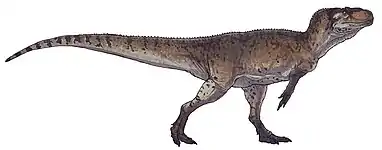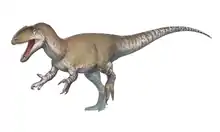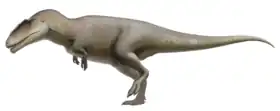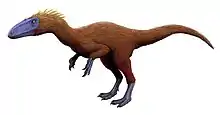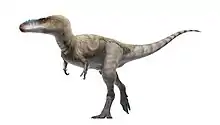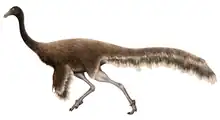Dolichosuchus
Dolichosuchus (meaning "long crocodile") is the name given to a genus of dinosaur from the Triassic. It was originally classified in the disused family Hallopodidae, but has since been reclassified as a coelophysoid. A single fossil (consisting of a single lower leg bone, or tibia) was found in Germany. Since only one bone was discovered, the genus is considered a nomen dubium. Some scientists have noted that the tibia closely resembles those of Liliensternus and Dilophosaurus.[1]
| Dolichosuchus Temporal range: Norian ~ | |
|---|---|
 | |
| Tibia | |
| Scientific classification | |
| Domain: | Eukaryota |
| Kingdom: | Animalia |
| Phylum: | Chordata |
| Clade: | Dinosauria |
| Clade: | Saurischia |
| Clade: | Theropoda |
| Clade: | Neotheropoda |
| Superfamily: | †Coelophysoidea |
| Genus: | †Dolichosuchus Huene, 1932 |
| Species: | †D. cristatus |
| Binomial name | |
| †Dolichosuchus cristatus Huene, 1932 | |
The type species is D. cristatus, described by Huene in 1932. The bone was recovered from the Lower or Middle Stubensandstein formation.[2]
References
- Rauhut and Hungerbuhler (2000). "A review of European Triassic theropods." Gaia, 15: 75-88.
- Huene, F. (1932). "Die fossile Reptil-Ordnung Saurischia, ihre Entwicklung und Geschichte." Monog. Geol. Pal., 4 (1): pts. 1 and 2, viii + 361 pp.
This article is issued from Wikipedia. The text is licensed under Creative Commons - Attribution - Sharealike. Additional terms may apply for the media files.

.jpg.webp)

